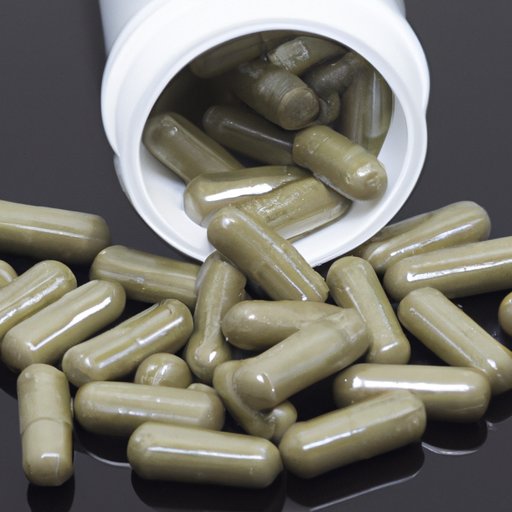
I. Introduction
UTIs, or urinary tract infections, are a common problem affecting millions of people every year. They can cause a range of uncomfortable symptoms, from painful urination to lower abdominal pain and fever. Thankfully, there are a variety of over the counter (OTC) medications available that can help alleviate these symptoms. In this article, we will explore the top OTC medicines for UTI relief, as well as natural alternatives and prescription options for those seeking to manage their UTI symptoms.
II. Top 5 Over the Counter Medicines for UTI Relief
1. Azo Urinary Pain Relief
Azo Urinary Pain Relief is a top-selling OTC medication specifically designed to alleviate UTI symptoms. Its active ingredient, phenazopyridine hydrochloride, targets urinary pain and burning sensations by numbing the bladder and urethra. Azo Urinary Pain Relief does not treat the bacterial infection itself, but it does provide fast-acting relief from the uncomfortable symptoms associated with UTIs.
2. Cystex
Cystex is another OTC medicine designed to alleviate urinary discomfort caused by UTIs. It contains methenamine, which works to prevent the growth of bacteria in the urinary tract while simultaneously reducing inflammation and pain. Cystex is also formulated with salicylate, an analgesic that provides relief for UTI-related pain and discomfort.
3. Uristat
Uristat is a pain relief medication that contains phenazopyridine hydrochloride as its active ingredient. Like Azo, Uristat works by numbing the bladder and urethra to alleviate UTI symptoms such as burning and pain during urination. Uristat does not treat the bacterial infection itself, so it is important to seek medical treatment if symptoms persist.
4. AZO Cranberry Gummies
AZO Cranberry Gummies are a popular natural supplement formulated to help promote urinary tract health. They contain a significant amount of cranberry extract, which is believed to contain properties that prevent harmful bacteria from sticking to the bladder wall. AZO Cranberry Gummies are not a replacement for antibiotics, but they can be a helpful addition to managing UTI symptoms.
5. D-Mannose
D-Mannose is a natural sugar that is believed to help prevent bacterial infections in the urinary tract. It works by binding to bacteria and flushing it out of the body through urination. D-Mannose is not a treatment for UTIs, but it can be effective in preventing recurring infections when taken as a supplement.
III. Understanding UTI Symptoms: How Over the Counter Medicines Can Help
UTIs are typically caused by bacteria in the urinary tract, and they can cause a range of unpleasant symptoms. Common symptoms of UTIs include:
– Painful urination
– Strong, persistent urge to urinate
– Passing frequent, small amounts of urine
– Cloudy or foul-smelling urine
– Lower abdominal pain or discomfort
– Fever, chills (in severe cases)
OTC medications can provide relief from these symptoms by targeting the pain and discomfort associated with UTIs. They work to numb the bladder and urethra, reduce inflammation, and alleviate pain during urination. UTI sufferers should drink plenty of water and avoid irritating foods and drinks to hasten the healing process.
IV. Natural Alternatives to Over the Counter UTI Medicines
There are several herbal remedies and lifestyle changes that may provide relief from UTI symptoms. These include:
– Drinking plenty of water to flush bacteria out of the urinary tract
– Increasing vitamin C intake, which can help promote a healthy urinary tract
– Taking probiotics to maintain a healthy balance of good bacteria in the gut and urinary tract
– Applying heat to the lower abdomen to reduce discomfort and relax the bladder muscles
– Adding garlic to the diet, which has antibiotic properties that may help fight off infections
While natural remedies can provide some relief from UTI symptoms, they are not a replacement for antibiotics or OTC medications. It is important to see a doctor for proper diagnosis and treatment if symptoms persist.
V. OTC UTI Medicines vs. Prescription Meds: What’s the Best Course of Treatment?
For severe UTIs, prescription medications may be necessary to clear the infection. Antibiotics are typically the first line of treatment for UTIs, as they can quickly and effectively kill the bacteria responsible for the infection. OTC UTI medications may be sufficient for mild UTIs but are not effective at treating the underlying bacterial infection.
Factors that may influence which treatment path is best for different individuals include the severity of the UTI, past medical history, and the potential for drug interactions or side effects. It is important to consult with a medical professional to determine the best course of treatment.
VI. The ABCs of UTI Medications: How to Choose the Right OTC Option for You
When selecting an OTC medication for UTI relief, be sure to consider the active ingredients, intended purpose, and potential side effects. It is also important to read the label and follow the dosage instructions carefully to avoid any adverse reactions. Consulting with a pharmacist or medical professional can help you choose the best OTC medication for your individual needs.
VII. UTI Emergencies: When to Seek Medical Attention and When OTC Meds Will Do
UTI symptoms can range from mild discomfort to severe pain and fever. It is important to seek medical attention if symptoms persist or worsen, especially if fever or bleeding occurs. Severe UTIs may require prescription medication to clear the infection, while milder cases may be effectively treated with OTC medications and natural remedies.
VIII. Conclusion
UTIs are a common condition that can cause uncomfortable symptoms but are treatable with different medications. OTC UTI medications such as Azo, Cystex, and Uristat can provide fast-acting relief from pain and discomfort, while natural remedies such as D-Mannose and cranberry extract may help prevent recurring infections. Prescription medications are typically reserved for severe UTIs that require antibiotic treatment. The key takeaway is to seek medical attention if symptoms persist or worsen and to carefully consider the best course of treatment for individual needs.





